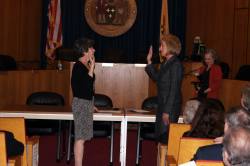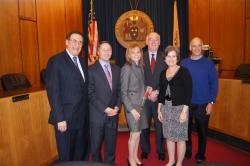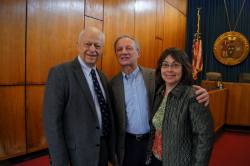Do It Yourself Mailing in Scarsdale Village
- Details
- Hits: 3974
 No more waiting online at the post office at 29 Chase Road in Scarsdale Village. A new automated postal center has now been installed in the post office allowing customers to send packages and letters and purchase stamps without waiting online for customer service.
No more waiting online at the post office at 29 Chase Road in Scarsdale Village. A new automated postal center has now been installed in the post office allowing customers to send packages and letters and purchase stamps without waiting online for customer service.
These new, user-friendly machines do almost everything. You can pay for a box, weigh it, calculate and purchase postage for parcels up to 70 pounds and even buy insurance for your shipment.
In Scarsdale, since the post office is often open even when the customer service window is closed, you can now take care of all of your postal needs in the off-hours. Valerie Jackson, the supervisor of the Scarsdale branch pointed out that the building is open on weekends for those who have mail to pick up from post office boxes on the site.
The next time you’re in the Village, stop buy and put the new machine to the test.
Sherwood is Honored at the 2011 Scarsdale Bowl Dinner
- Details
- Hits: 6160
 The atmosphere was warm and festive at the 2011 annual Scarsdale Bowl Dinner at Lake Isle Country Club on April 6. This year’s honoree, Emily Sherwood, is a beloved member of the community and her wide network of friends and supporters came out in force to celebrate her service to Scarsdale.
The atmosphere was warm and festive at the 2011 annual Scarsdale Bowl Dinner at Lake Isle Country Club on April 6. This year’s honoree, Emily Sherwood, is a beloved member of the community and her wide network of friends and supporters came out in force to celebrate her service to Scarsdale.
The room overflowed with present and former Mayors, Village Trustees, School Board members, and participants in the many activities, causes and committees on Emily’s lengthy resume. Also on hand were three of the Sherwood’s four children, her husband, mother, and family friends. The 2011 Bowl Committee should be credited with identifying an honoree who has touched so many lives in a meaningful way.
The 2011 Chair of the Bowl, former School Board member Rita Golden, offered welcoming remarks and Rabbi Rick Jacobs gave the invocation. He told the group

2010 Bowl Winner Jackie Irwin briefed the room on the work of the Scarsdale Foundation and asked the community to be generous with college scholarship support for Scarsdale students. The Foundation provides need-based scholarships to those entering their sophomore, junior and senior years, and last year awarded $76,000 to 24 students. Sherwood serves on the Board of Trustees of the Foundation. Irwin recognized Nancy Michaels who has served as the secretary/treasurer of the Bowl for three years and presented her with a gift.

All kidding aside, he told the group how thankful he was to have her as a role model and marveled out how many friendships she maintained while juggling a dizzying array of commitments. He ended by telling the group that "my Mom has more Facebook friends than I do!"
Her first-born son Matt continued a family tradition and wrote a poem about the honoree. Speaking in verse he called Sherwood a real life superhero with rippling

“She has a Penn education and a phd,
But she could have used an engineering degree”
And ended with,
“You’ll continue to strive higher.
This won’t be the last time we see your face in the Scarsdale Inquirer.”
Next, she was given a humorous and heartfelt toast by three colleagues from the Board of Education; Florie Wachtenheim, Terri Simon, and Bob Steves.

Rita Golden then presented Sherwood with the Scarsdale Bowl, and Emily took the podium. She said she was “totally overwhelmed” and thanked Rabbi Jacobs, her sons, her family, her fellow Board members, the Bowl Committee and Rita Golden. Sharing the limelight with the audience she said, “There are dozens and dozens of individuals who qualify for this Bowl award because of your tireless activities to make our village and schools better -- and indeed – this is an evening that celebrates the accomplishments of our entire volunteer community."
She said that “collaborative decision-making” is done well in Scarsdale, and that the non-partisan system is the ultimate model of collaboration. Referring to the

Sherwood encouraged all to give their time and told the group that she had “received so much more in return for volunteering in Scarsdale than I could possibly have given.”
The evening was a wonderful celebration of Sherwood, Scarsdale and all the volunteers that work endless hours for the community.
The 2011 Scarsdale Bowl Committee

Rita Golden, Chair
Jane Buck
Matthew Callaghan
Marc Carter
Jonathan Drescher
Malula Gonzalez
Liz Gruber
Joyce Hirsch
Carolyn Mehta
Laurence Mintzer
Anne Moretti
William Natbony
Robert November
Seth Ross
Tara Smith Tyberg
Non-voting
Jacqueline E. Irwin, Ex Officio

Nancy Michaels, Secretary/Treasurer
It's Official: Scarsdale Swears In New Mayor and Trustees
- Details
- Hits: 7292
 Miriam Levitt Flisser was sworn in as Mayor of Scarsdale on Monday April 4th at Scarsdale Village Hall. Village Clerk Donna Conkling administered the oath to Dr. Flisser and three recently elected Village Trustees; Robert Steves who will serve his second two-year term, as well as Stacey Brodsky and Robert Harrison who were sworn in to serve two-year terms.
Miriam Levitt Flisser was sworn in as Mayor of Scarsdale on Monday April 4th at Scarsdale Village Hall. Village Clerk Donna Conkling administered the oath to Dr. Flisser and three recently elected Village Trustees; Robert Steves who will serve his second two-year term, as well as Stacey Brodsky and Robert Harrison who were sworn in to serve two-year terms.
Friends, family, Village staffers and well-known faces from around the county came to witness the ceremonies. County Executive Rob Astorino and Greenburgh Town Supervisor Paul Feiner were on hand as well as several former Scarsdale Mayors and past Village Trustees.

Flisser vowed to serve seriously and joyously and to continue to “make Scarsdale a beautiful place to live.” Referring to her heritage as the child of Holocaust survivors, Flisser said, “I represent the parents of a million children who were unable to protect them and bring them to this day.”
The mood was both solemn and hopeful as observers put aside differences that arose during the contested election, celebrated Scarsdale’s new leadership and set their sights on a bright future for the Village.
(Pictured Above: Mayor Miriam Flisser and County Executive Robert Astorino)




Trash Talk, Shady Roofer and Missing Jewels from the Scarsdale Police
- Details
- Hits: 5062
 Missing Jewels: On 3/23 a Crawford Road woman reported that jewelry valued at $13,000 had disappeared from her home when she was in the hospital between November 1 2010 and January 5, 2011. The jewelry had last been seen in a locked cabinet in her bedroom but the key to the box was kept in the kitchen. The woman will provide photos of the missing jewelry to police.
Missing Jewels: On 3/23 a Crawford Road woman reported that jewelry valued at $13,000 had disappeared from her home when she was in the hospital between November 1 2010 and January 5, 2011. The jewelry had last been seen in a locked cabinet in her bedroom but the key to the box was kept in the kitchen. The woman will provide photos of the missing jewelry to police.
Arrests: On the night of March 22nd, Silbert Gray Jr. of the Bronx was picked up in the Bronx for a traffic offense. When police checked his license they found that there was an outstanding warrant for his arrest in Scarsdale since 2006. Gray was transported to Scarsdale and arrived after midnight on 3/23. He was processed, released and given a court date of 3/30/11.
Anthony J. Rodriguez, age 21 of Bronxville appeared at Village Hall on March 25 to clear up an outstanding arrest warrant. Rodriguez was taken to police headquarters where he was processed and released on $100 bail, pending a 3/30 court date.
Fraud: A 92 year-old Greenacres woman appears to be the victim of fraud on the part of a roofer. A caregiver for the elderly woman found a receipt for a $2,400 withdrawal from the woman’s Chase account. When she asked about it, the woman said she had no memory of making the withdrawal. The old woman suffers from short-term memory loss. The caregiver asked questions at the bank and a teller reported that a bald man, claiming to be her roofer, accompanied the woman to the bank while she withdrew the funds. The teller asked the man for his business card and he said he would bring one in from his car but he never did. The woman no longer drives after she had a serious accident last year and her children live far away. Her children have taken away her personal checks in the past. Police will follow-up to assess her ability to care for herself.
A Foxhall Road man came to police on 3/23 to report that he received a collection notice for a debt he had not incurred. The notice was from Sunrise Credit Services and it said that the man owed $267.95 to Cablevision. The man told police that he was up to date with his payments to Cablevision. The collection agency was trying to collect the debt from a customer with another name, but with the same social security number as the Scarsdale man. Cablevision believes that someone used the Scarsdale’s mans social security number to open a fraudulent account.
Dog bite: A Fox Meadow mother came to police headquarters on the afternoon of 3/24 to report that a dog bit her son at the Fox Meadow school field on 3/20. Her son was riding his bicycle when a gold and white dog named “Dunkin” chased him. The boy fell off his bike and the dog bit the boy’s upper thigh. The bite punctured the skin and caused bruising and swelling. The dog’s owners supplied up-to-date vaccination papers.
Trash: A Nelson Road man complained that kids had thrown garbage out of the window of a 2000 Honda Civic onto his property on the afternoon of 3/25. The man identified the kid who was driving and police found that the garbage was from McDonalds. Police went to SHS and spoke to the young man who was driving the car. He admitted to throwing the garbage and was a given a summons. The boy identified the passenger in the car and said, “We both did it.” Police found the second young man who also admitted throwing the garbage and claimed they “thought it was funny.” He was also given a summons. Fred Goldberg, Assistant Principal was notified and he said that he would contact the boys’ parents.
A Butler Road man reported that the drivers of a silver vehicle had placed four bags of yard waste on his property at noon on 3/21. The man had the license plate number of the car and police identified the driver as Thomas Darby of Congers, New York and tracked him down. Darby came to headquarters and admitted to leaving two bags of refuse on Butler Road. The waste came from the Verizon substation off Locust Lane. He agreed to properly dispose of the waste.
Trouble: The counselor at a residential home, Search for Change on Post Road reported that a resident had created a disturbance and left the house on foot on the evening of 3/22. Police found the woman on the Post Road and she was calm. However, due to problems she was having with other residents in the house, the counselor did not want her back in the house. The woman contacted her mother who came to pick her up, signed her release and took her into custody.
A young man from Scarsdale came to police on 3/26 to complain that he was receiving annoying text messages from two people and wanted them to stop. He said that there was a history of antagonism between him and the two texters. Police called the two and instructed them to cease.
A Colvin Road woman called police at 5 am on Monday for help restraining her husband. The man has mental illness and wanted to go out and visit. Police went to the home and convinced him to remain inside.
Locked in: A Yonkers woman locked her three-year-old son and her keys inside her car on Chase Road on the afternoon of 3/26. Police called the Heathcote Gulf station and they sent someone who was able to unlock the car.
Animals: A Woods Lane resident called police to report that birds were flying around inside the house at 8 am on Sunday 3-27. Police went to the home, opened the windows and the birds flew out.
A man accidentally ran over his own dog at a Brookline Road home on Sunday afternoon 3-27.
Hoaxed and Harassed: Report from the Scarsdale Police
- Details
- Hits: 7303
 Hoax: The 91 year-old grandfather of a Scarsdale girl drove up from New York City with his driver and his aide after he received a phone call stating that his granddaughter had been arrested on the afternoon of March 17. The man explained that he had received a call from his granddaughter and a public defender who asked him for his credit card number. Fortunately he did not provide the credit card number because police had no record of the girl’s arrest. They contacted her father who confirmed that his daughter was in school. The grandfather was the victim of fraud.
Hoax: The 91 year-old grandfather of a Scarsdale girl drove up from New York City with his driver and his aide after he received a phone call stating that his granddaughter had been arrested on the afternoon of March 17. The man explained that he had received a call from his granddaughter and a public defender who asked him for his credit card number. Fortunately he did not provide the credit card number because police had no record of the girl’s arrest. They contacted her father who confirmed that his daughter was in school. The grandfather was the victim of fraud.
Leave Please: A member of the clergy at IHM in Scarsdale called police for help when a disruptive man refused to the leave the premises. Gregory Brown of the Bronx came to the church on the afternoon of March 14 seeking money and after the Father gave Brown a donation Brown refused to leave. When police arrived he left the area.
Arrests: On the night of March 19, police responded to call about disorderly kids at Greenacres Field. When they arrived, the kids fled. However one 17 year-old boy was found hiding in the backyard of an adjoining home. The boy had been drinking and was in possession of beer. He was brought back to dispatch where his father was contacted come to pick him up. The boy was issued summonses for unlawful possession of alcohol and for being on the school field after operational hours.
John Braile of East Setauket, NY went to Village Hall on 3/15 at noon to take care of an outstanding arrest warrant for a vehicle violation . The man was placed under arrest, booked and processed. He was given a court date of 3/23 and released on $200 bail.
. The man was placed under arrest, booked and processed. He was given a court date of 3/23 and released on $200 bail.
Car in Flames: A car owned by Eli Wachtel of Shaw Road caught fire when it was parked on Garth Road on the afternoon of 3/14. Police used three fire extinguishers to put out the fire.
Accidents: As the car fire was being extinguished, a police car collided with a car driven by a Garth Road man at 5 pm on March 14th. The driver of the civilian car left the scene because of the car fire on Garth Road. A traffic cop instructed the man to turn onto Ardsley Road.
A Scarsdale sanitation worker reported that his pick-up vehicle had hit a parked car on the morning of March 18. The worker left the pick-up facing east on Kingston Road in Greenacres and went to the back of 16 Montrose Road to pick-up garbage. When he returned, he found that the vehicle had travelled across Kingston and collided with a car parked in the driveway of 14 Montrose Road.
Damage: The front hood of a 2005 Audi was scratched on the evening of 3/18. The owner believes the damage may have been done with the car was parked at the Scarsdale Middle School for a performance.
Trouble: A woman got into an altercation with the parking attendant at the lot behind HSBC in Scarsdale Village on the morning of March 16th. The woman had a doctor’s appointment on Overhill Road and rather than park in the lot under that building she wanted to use the outdoor lot. However, since the outdoor lot is reserved for customers of businesses on Scarsdale Avenue the attendant instructed her to park across the street. The angry woman called the police to complain but was gone when police arrived.
A concerned 20 year-old Scarsdale boy came to police headquarters at 3:30 am on 3/19 to report that he had been in a fight at a Post Road home earlier in the night. Though he was not injured he did admit to drinking and wanted advice from the police. Given that he was underage, police called the boy’s father to pick him up and no action was taken.
An Overlook Road woman reported the receipt of upsetting emails from her son’s girlfriend who in Hong Kong on March 16th. The girlfriend went to Hong Kong to visit the woman’s son. Police said that the emails were not criminal in nature and told the woman to stop contacting the girlfriend.
Locked Out: A Fox Meadow Road woman locked herself out of her house on the afternoon of 3/16. Police were unable to find any way to get in and called a Garth Road locksmith who was able to get into the house.
Animals: Police received a report that a dog had been hit by a car on the Heathcote Bypass on the morning of March 18. However, when they went to investigate they found a dead possum.
Noise: In the early morning hours of 3/19, police received reports of loud kids on Hyatt Field and in Davis Park. At Hyatt Field, the kids fled when they saw the police and at Davis Park police asked them to disperse and they cooperated.
Harassed: On March 16 the father of a Wildwood Road girl came to police to complain that his daughter was receiving harassing posts on her Facebook account. She was named on the “Westchester smut list” with three of her friends from SHS.
A Fox Meadow woman called police on the afternoon of March 20th to complain that she had been verbally harassed by her husband while they were driving. The two got into a fight about putting their children in car seats. Police told the woman that this was not a police matter and the woman agreed to contact her therapist for help.
Fall: Arlene Kolbert, age 68 of Irvington tripped and twisted her ankle on a curb in front of Great Stuff in Scarsdale Village on the afternoon of March 17. She was taken to White Plains Hospital by SVAC for treatment.
Signs: Police removed two signs posted on Village property for a company named “iDriveyourCar.com from Post and Fenimore roads on March 19. The company, which is located in Westport, CT, was issued a citation for violating Village code.
A Stratton Road woman awoke on the morning of 3/19 and found a street sign and a traffic cone on her front lawn. She also reported that she heard the doorbell ring at 2:15 am the previous night, but did not answer it.
The stop sign at Burgess and Richbell Roads was defaced. The word “ZOOTING” was written on it with a black sharpie. The damage was discovered on March 19th.
Found: A postal worker found a black purse when she was delivering mail on March 14. Police found the name of the owner insider the purse and her father agreed to come in and pick it up.







